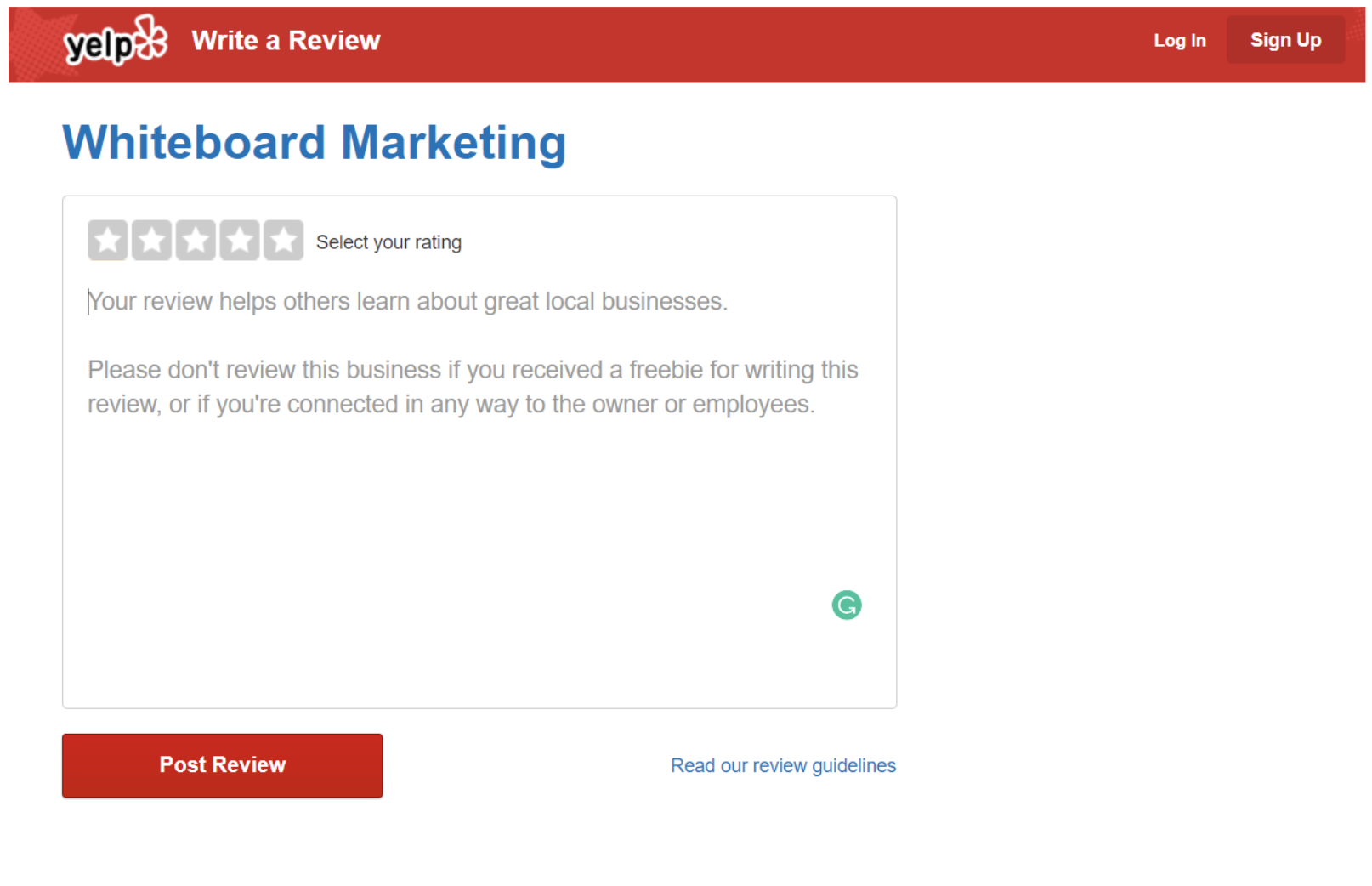Yelp can be a very confusing platform for a lot of small business owners. It can be hard to determine if Yelp is the right platform for your industry. It can also be difficult to optimize your profile to get reviews and to be found by potential customers. You may have noticed that Yelp has made some changes over the years to its algorithm that affect how businesses ask for reviews as well. Here are some answers to common Yelp questions and our recommendations to help you avoid being penalized by Yelp’s algorithm.
“Should I be asking my customers for Yelp reviews?”
If you ask Yelp, the answer to this question will always be no. Yelp specifically directs all businesses to not ask customers to leave reviews, and has coded its software to find solicited reviews and remove or hide them.
“What is Yelp’s reasoning behind not asking for reviews?”
Yelp says, “We actually discourage business owners from asking their customers to write reviews. For one thing, most businesses tend to ask their happiest customers to write reviews, not the unhappy ones. These self-selected reviews tell only part of the story, and we don’t think that’s fair to consumers. We would much rather hear from members of the Yelp community who are inspired to talk about their experiences without a business owner’s encouragement.”
Yelp’s goal is to encourage authentic, unbiased opinions on its site. Yelp wants people to voluntarily leave their thoughts instead of being asked by the business. They believe that a business requesting reviews from their customers will lead to biased posts.
“I really want more Yelp reviews. What do I do?”
Yelp can see if someone is directed there from a specific URL sent by a business, so you don’t want to send your clients direct links to review you. What you can do if you want to increase your Yelp reviews would be to ask your customers in person to leave you a review on Yelp once they get home. It can be as simple as saying, “We hope you really enjoyed your experience with us today. If you have time later today, we would really appreciate you taking a moment to review us on Yelp.” If they are at home and search you on Yelp, then leave a review, it appears more organic and authentic to Yelp’s side and it may not be flagged by its algorithm.
We always recommend, however, that our clients focus more on Facebook, Google, and industry-specific review sites rather than Yelp. Although these platforms are always moving to ensure reviews are authentic and left by real people (which your business should want, too!), they do not penalize you for asking for reviews. You cannot pre-qualify customers to only ask promoters to give feedback, which is against Google’s policies, but you can ask customers to leave reviews on these sites.
This also gets you the most bang for your buck. If someone writes a review, but it is removed or hidden, the value of the review is decreased. If someone is taking the time to write you a great recommendation, you want to make sure it can be viewed by as many people as possible.
“Where are my Yelp reviews going?”
Have you received notifications of new reviews from your patients or customers, but can’t find them on your Yelp profile? As part of Yelp’s “no review solicitation policy,” it employs an algorithm that takes reviews it suspects to be solicited by the business and puts them into the hard-to-find “Not Recommended” section at the bottom of your profile. If you scroll past all of the “Recommended” reviews from Yelp, you will see this link to the rest of your reviews. This section is for reviews that are “not currently recommended” by Yelp:
According to Yelp, “there are a number of reasons why a review might not be recommended. For example, the review may have been posted by a less established user, or it may seem like an unhelpful rant or rave. Some of these reviews are fakes (like the ones we see originating from the same computer) and some suggest a bias (like the ones written by a friend of the business owner), but many are real reviews from real customers who we just don’t know much about and therefore can’t recommend. It’s also important to note that because our recommendation software is automated, the Yelp Support team cannot manually override the software to recommend or not recommend a review.”
So, you cannot petition Yelp to move reviews from the “Not Recommended” area to the top of your page either. And, if Yelp senses through its algorithm that you have asked that customer to write the review, it will put it into the “Not Recommended” area and it will not be added into your star rating. This can be very frustrating for businesses that have a lot of great reviews in the “Not Recommended” area but, unfortunately, they cannot add to their star ratings on their profiles.
Quick Tip: To showcase these reviews, try putting them on your website inside a scrolling widget to allow potential and current patients or clients to see your great reviews!
Tips to help your reviews avoid the “Not Recommended” area:
- Do not have a direct link on your website that directs people to your “Write a Review” page on Yelp:
- Do not ask customers to write reviews from the same IP address at your store, office, etc. For example: asking them to leave a review from a tablet or work laptop at your company’s location.
- Do not send customers a link in an email to write you a review on Yelp.
“Can this be avoided if I advertise on Yelp?”
According to Yelp, there is no better treatment for your firm if you advertise on Yelp or not. “Our recommendation software treats advertisers and non-advertisers exactly the same. You’ll find plenty of Yelp advertisers with negative reviews, and plenty of non-advertisers with five-star ratings across the board.”
Our Thoughts
Unless Yelp is specifically influential for your industry or region, we recommend focusing on industry-specific sites, such as Angie’s List, Houzz, or HealthGrades, as well as Google and Facebook, to grow your digital reviews presence. Unfortunately, Yelp puts up a lot of barriers to having a great reviews profile on its site, and we want you to get the most out of your reviews program. Each review you receive is precious, and its reach should be amplified in every way so the most people can see it and be drawn to your business.
Your business is unique, and people should hear why from the mouths (or keyboards!) of your own customers. For more reviews questions or a consultation on the best reviews practices for your company, contact us today!



